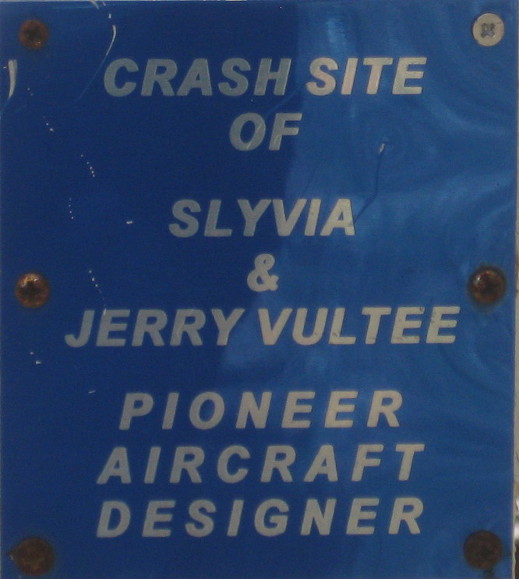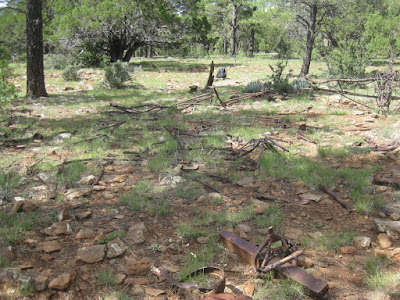Several
members of the Skyliners hiking group had long wanted to visit the
site of the 1938 Vultee plane crash. A 2011 article in the Verde
Independent1,
a local newspaper, had whetted our interest and we had already made
one unsuccessful attempt last February only to be foiled by an
18-inch snow cover on top of the mountain. Now, reinforced by the
accompaniment of Bill Reller, who had visited the site a number of
years ago, we set out for another attempt.
Several
members of the group left from Cottonwood and drove to Sedona where
we met with others at the Burger King Restaurant. From there we
continued north on Hwy 89A to meet the final members of our group at
Indian Gardens in Oak Creek Canyon. We then proceeded on up the
canyon toward Flagstaff, turning left onto Forest Road 535 between
mile markers 390 and 391. The best directions we had to the site
started at the East Pocket Lookout Tower and we originally planned to
start our search from there. The distance to the tower from where we
first turned onto FR 535 turned out to be 23.1 miles. The first 5.5
miles (FR 535) was well maintained, the second 3.3 miles (FR 536)
contained a few large mudholes that we had to maneuver around and the
third section (FR 231) was well maintained but with a few rough
spots. With care, the entire route could have been traversed in a
normal passenger vehicle, although a high-clearance vehicle is
recommended.
As
noted, our original intent had been to drive all the way to the
lookout tower and start our search from there. The very sketchy
directions we had used the tower as a reference point. We found out
later that it is not possible to drive all the way to the tower; the
road is blocked by a closed gate about 0.5 miles short of it.
As
it were. Bill Heller remembered turning off FR 231 for the crash site
before actually reaching the tower. That was true; however, we
turned off about 1.4 miles too soon. About 0.4 miles after turning
off, we reached a spacious parking area, located right on the rim
that, that provided an excellent view of the country below us.
 |
From the lot where we parked – looking across Sedona and the
red rock country
|
This
seemed as good a place as any for a group photograph.
Although
it was now pretty obvious that we were not as near the crash site as
we had planned, we decided to leave the cars and start our hike from
here anyway.
It
was not as though the crash site were unknown; a good number of
reports are to be found describing previous visits to it. However,
nowhere in any of these reports had I found location coordinates or a
good description of how to get there. I think that is partly because
the place is so deceptively simple to find once you know where it is.
In our case, we were sure that if we just traveled along the rim
toward East Pocket, we could not fail to find it.
As
we made our way east along the rim, we were constantly treated to
great views out over the red rock country. The below photograph,
looking across Sedona to Airport Mesa, shows faint contrails from an
air show currently in progress there.
 |
Contrails above airport, see slightly right and below center
|
After
traveling for about half a mile along the rim we were once again very
close to FR 231 on our left. It grew farther away as we continued
along the rim but then grew closer again until, about 1.3 miles from
the parking lot, we found ourselves actually hiking on the forest
road. We continued along it for about 0.2 miles until we came to an
old road, now closed to vehicular traffic, that I later learned was
old FR 231, that once led to East Point Tank. Looking straight ahead
on the main road (FR 231), we could see a gate across that road about
a hundred yards ahead. Someone remembered the gate from a previous
trip to the area and thought it was very near the crash site, so we
turned south on old FR 231 road and then left it after a short
distance to follow more closely along the rim.
When
we had hiked far enough that we thought we should have encountered
the crash site, we decided to turn northeast and hike to the tower.
We could eat lunch there, reorient ourselves and get a fresh start on
our search. Additionally, we had been told that the tower would be
manned and that we might be able to arrange a visit to the
observation booth. That turned out to be the case and the attendant
was quite helpful in providing us some additional information to aid
us in our search.
After
everyone had visited the tower and we had eaten lunch, we headed down
FR 231 to the gate and the junction with old FR 231 just beyond it.
It turns out that we were actually headed in the right direction when
we had previously turned south on that road. We just hadn’t gone
far enough. At the tower, we were joined by a Lady from Mesa, AZ who
had hiked up A B Young trail and who stayed with us for the remainder
of our hike before heading back the way she had come.
The
distance to the junction from the tower proved to be just 0.6 miles,
as measured by GPS, and on reaching it we once again headed south
along the rim. This time we followed the old roadbed for 0.3 miles,
to the top of a fairly steep hill, before it veered to the east and
we left it to travel south along the rim. It was a lot farther than
we had expected and we were about to turn back, thinking that we had
simply missed it among the numerous ferns growing along the rim and
now sporting their fall rust color. Fortunately, just at that moment
someone spotted the small white cross erected at the site in 2011 by
Peter Vultee, Jerry's son, and his cousin John Vultee2.
We had traveled, following closely along the rim as we did, some 1.3
miles from FR 231. Much farther than any of us had thought. The
trip back, with no longer any need to hug the rim, was a little
shorter, about 1.1 miles.
 |
Memorial cross erected at the Vultee crash site
|
The
blowup displayed below shows
the plaque mounted in the center of the cross.
 |
Enlarged view of plaque mounted on cross
|
The
remains of a major part of the airframe assembly can be seen to the
right of the cross in the above photograph and debris is scattered
over a relatively small area extending from there to the left of the
cross. This debris field is seen from another angle in the below
photograph.
 |
Vultee crash site debris field
|
The
major part of Jerry Vultee's life and career, along with the history
of the company he founded are described in an article appearing on
the Davis-Monthan Aviation field Register web
page3
and the aforementioned article published in the Verde
Independent speculates on why
he was flying in such bad weather. I will not elaborate further
here, but will leave it to interested readers to review those sources
themselves.
Just
a few yards beyond the site, we had an exhilarating view from the rim
of the Dry Creek watershed. Although we looked very hard, we could
not see Vultee Arch from the rim, finally deciding it was obscured
from our view by the west wall of Sterling Canyon. Later, I did
determine that it is 1.5 miles from the crash site at a bearing of
1630
true. The photograph below shows the rough, beautiful country spread
out below us.
 |
Dry Creek watershed viewed from the Vultee crash site
|
On leaving the site, we
took the most direct route back to the junction of FR 231 with old FR
231. Meanwhile, three hikers had gone on ahead to retrieve vehicles
and meet us at the junction. We all then drove back to the parking
area to retrieve a vehicle still parked there. What had been
intended as a stroll in the woods, so to speak, become a good hike by
the time we had finished and we surely would not have found the site
at all without the help of Bill Reller and the information provided
by the tower attendant.
The
following map (below)
shows the immediate area of the crash site and the fire tower.
Forest Road 231 is shown in purple, the short drive from FR 231 to
the rim parking lot is shown in yellow, the dark green line shows our
hike to the tower and the red line shows the most direct route from
FR 231 to the crash site. The light green line is A B Young Trail.
It is 1.1 miles in length, so a 2.2 mile round trip hike will get you
from a car parked at the junction to the site and back. The next
time we will know this.
 |
Close up map of the Vultee Crash Site and the East Pocket area
|
 While we were rambling
around searching for the crash site, I found a few colorful flowers.
The most attractive of these is shown here (left).
I am not sure, but I think it may be a desert dahlia.
While we were rambling
around searching for the crash site, I found a few colorful flowers.
The most attractive of these is shown here (left).
I am not sure, but I think it may be a desert dahlia.
Meanwhile, Akemi had
become fixated on mushrooms. She photographed a number of different
specimens, sending those she found most interesting to me for
inclusion in the hike report.
Below are Akemi's
mushroom photographs. The colorful, spherical one (first two photos
below) is poisonous and psychoactive. It was featured in a recent
issue of Arizona Highway Magazine4
and erroneously listed as edible, causing that issue to be recalled.
 |
Fly agaric or fly amanita mushroom
|
 |
Fly agaric or fly amanita mushroom
|
Of the two photographs
below the one on the left was included because it is shaped like a
heart. The one on the right, on the other hand, turned out on closer
examination to be the author taking a nap.
 |
Heart-shaped mushroom
|
 |
The author posing as a mushroom
|
We actually hiked 5.4
miles. But just hiking from the FR 231/old FR 231 junction to the
crash and back would be 2.2 miles with an elevation gain of 210 feet
and a highest elevation of 7025 feet.
1
http://verdenews.com/main.asp?SectionID=74&SubsectionID=114&ArticleID=43609
2
http://verdenews.com/main.asp?SectionID=74&SubsectionID=114&ArticleID=43609
3
http://www.dmairfield.com/people/vultee_je/
4
http://arizonahighways.wordpress.com/2013/09/13/arizona-highways-magazine-issues-statement-about-october-issue/


No comments:
Post a Comment